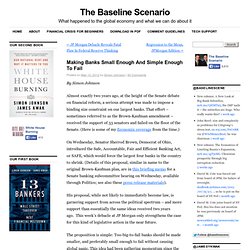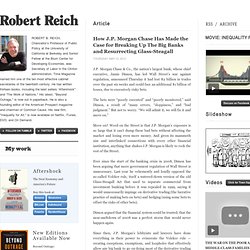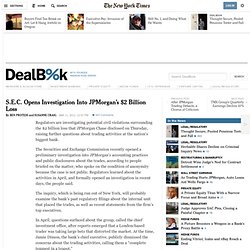

Making Banks Small Enough And Simple Enough To Fail. By Simon Johnson Almost exactly two years ago, at the height of the Senate debate on financial reform, a serious attempt was made to impose a binding size constraint on our largest banks.

That effort – sometimes referred to as the Brown-Kaufman amendment – received the support of 33 senators and failed on the floor of the Senate. (Here is some of my Economix coverage from the time.) On Wednesday, Senator Sherrod Brown, Democrat of Ohio, introduced the Safe, Accountable, Fair and Efficient Banking Act, or SAFE, which would force the largest four banks in the country to shrink. (Details of this proposal, similar in name to the original Brown-Kaufman plan, are in this briefing memo for a Senate banking subcommittee hearing on Wednesday, available through Politico; see also these press release materials).
His proposal, while not likely to immediately become law, is garnering support from across the political spectrum – and more support than essentially the same ideas received two years ago. Jamie's Cryin: Dimon, J.P. Morgan Chase Lose 2 Billion. How J.P. Morgan Chase Has Made the Case for Breaking Up The Big Banks and Resurrecting Glass-Steagall) J.P.

Morgan Chase & Co., the nation’s largest bank, whose chief executive, Jamie Dimon, has led Wall Street’s war against regulation, announced Thursday it had lost $2 billion in trades over the past six weeks and could face an additional $1 billion of losses, due to excessively risky bets. The bets were “poorly executed” and “poorly monitored,” said Dimon, a result of “many errors, “sloppiness,” and “bad judgment.” But not to worry.
“We will admit it, we will fix it and move on.” Move on? Ever since the start of the banking crisis in 2008, Dimon has been arguing that more government regulation of Wall Street is unnecessary. Dimon argued that the financial system could be trusted; that the near-meltdown of 2008 was a perfect storm that would never happen again. Since then, J.P. In light of all this, Jamie Dimon’s promise that J.P. The losses here had been mounting for at least six weeks, according to Morgan. But let’s also stop hoping Wall Street will mend itself. S.E.C. Opens Investigation Into JPMorgan's $2 Billion Loss. Regulators are investigating potential civil violations surrounding the $2 billion loss that JPMorgan Chase disclosed on Thursday, raising further questions about trading activities at the nation’s biggest bank.

The Securities and Exchange Commission recently opened a preliminary investigation into JPMorgan’s accounting practices and public disclosures about the trades, according to people briefed on the matter, who spoke on the condition of anonymity because the case is not public. Regulators learned about the activities in April, and formally opened an investigation in recent days, the people said. The inquiry, which is being run out of New York, will probably examine the bank’s past regulatory filings about the internal unit that placed the trades, as well as recent statements from the firm’s top executives. In April, questions surfaced about the group, called the chief investment office, after reports emerged that a London-based trader was taking large bets that distorted the market.
Avast, Wall Street: At J. P. Morgan, there be whales! Terry Ponick WASHINGTON, May 11, 2012 – Remember those old “Jaws 2” trailers?

“Just when you thought it was safe to go into the water…” The same thought might be applied to Wall Street today. Futures have been sickly all night. And this morning, as of this writing, Dow futures are down a whopping 51 points, somewhat better than the negative 81 on the board just before the stroke of midnight last night. The cause, particularly after a relatively nice day yesterday? Can the hedgies bring down London’s Great White Whale? But the very size of the London position attracted the attention of big traders and hedge fund who placed bets against it, eventually causing the Morgan operation to lose $2.3 billion.
JPM’s gigantic bet—first revealed some weeks back by Wall Street Journal investigative reporter Gregory Zuckerman and friends—appears to have been run by “the London whale,” aka Bruno Michel Iksil, a J.P. Ditto for much of Dodd-Frank and the “Volcker Rule.” (Usual disclaimers apply.)